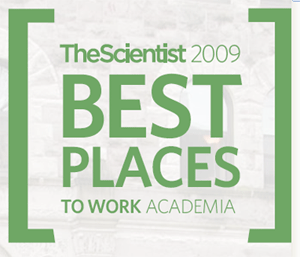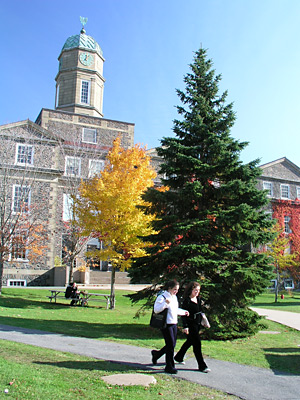 |
Dalhousie University has once again landed near the top of The Scientist magazine’s seventh annual Best Places to Work in Academia survey.
Dalhousie’s friendly nature, collegial spirit and its location in Halifax were singled out as some of the reasons why Dalhousie does consistently well in the annual survey.
Aaron Newman, who arrived at Dalhousie four years ago from the University of Rochester, says Dalhousie rates highly because of its collegial and collaborative work environment.
“What drew me here and keeps me here are the people,” says Dr. Newman, assistant professor with the Department of Psychology. He is also cross appointed with the Departments of Psychiatry and Surgery, both in the Faculty of Medicine. “In a lot of places, people get entrenched in their own disciplines, but I haven’t found that here… you really need a group of people with a shared vision, along with an institution that supports that vision.”
Professor Steve Aiken, who started working at Dalhousie just two years ago, is also impressed with the interdisciplinary nature of the research that goes on at the university. As an audiologist with the School of Human Communications Disorders, Dr. Aiken meets regularly with scientists and clinicians with expertise in psychology, surgery, engineering and physiotherapy, to name a few.
“There’s such a nice environment for working together across departments and getting things done,” says Dr. Aiken, previously at the Rotman Research Institute, University of Toronto. “There’s also good support from the school.”
Not to mention Dalhousie’s “fantastic” students, he adds. “Teaching is great when you’ve got such smart, keen and highly motivated students.”
 |
| The proximity of the university to other research facilities and major hospitals in Halifax is another reason why people like working at Dalhousie. |
Jure Gantar, acting dean in the Faculty of Arts and Social Sciences, would agree: The students make the difference. “I would say our students have the best attitudes and are very intelligent. They are often thinking as critically as their professors.”
When encountering new faculty members, he says, “the first thing I say is, the fall is beautiful, your colleagues are great and you’ll absolutely love the students.”
Dalhousie’s own workplace survey conducted earlier this year indicated the majority of respondents agree: the university is a pretty good place to work. However, only one-third of faculty members who responded said the university supports their research needs, while an equal number said it did not.
“We’re taking this very seriously,” says Martha Crago, vice president research. “Given that people were satisfied overall working at Dal, but not quite satisfied with research support is very concerning to us.”
Research Services is planning on conducting focus groups with faculty members at different stages in their careers over the next few months to explore the issue further. “We want to get a better sense of where the dissatisfaction is coming from and try to organize to make the situation better,” she adds.
Dalhousie placed fifth on the Top 10 International Academic Institutions, behind the Max Planck Institute of Molecular Cell Biology and Genetics in Dresden, Germany; The Weizmann Institute of Science in Rehovot, Israel; the University of Bristol in the U.K.; and the University of Groningen in The Netherlands.
Dalhousie was the top Canadian university, coming ahead of the University of Toronto, which rated tenth.
Among American institutions, Princeton University topped the list, followed by the University of California in San Francisco and Albert Einstein College of Medicine in the Bronx, New York.
Based in Philadelphia, PA., The Scientist is an international magazine addressing issues and events important to life scientists. It has a worldwide circulation of 75,000 subscribers.
LINKS: The Scientist magazine | 2009 Workplace Survey (PDF) on Dalhousie's Human Resources website
Comments
comments powered by Disqus
